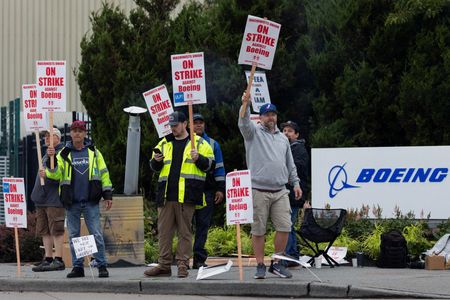By Joe Brock and David Shepardson
SEATTLE (Reuters) -Boeing is eager to get back to the bargaining table to limit damage and reach a settlement after 30,000 workers walked off the job on Friday, as the strike added challenges to its turnaround.
More than 30,000 International Association of Machinists and Aerospace Workers (IAM) members who produce Boeing’s top-selling 737 MAX and other jets in the Seattle and Portland areas voted on their first full contract in 16 years, with 94.6% rejecting it and 96% favoring a strike.
Brian West, Boeing’s chief financial officer, said on Friday that the company wants to get back to the table, acknowledging that a strike is concerning for production, delivery and finances. He said the walkout will make it harder for Boeing to meet the production of its best-selling 737 MAX jet target and stabilize its supply chain.
Moody’s put the planemaker’s rating on review, while Fitch said a prolonged could have meaningful operational and financial impact, increasing risk of a downgrade. On Thursday, S&P Global Ratings said that an extended strike could hurt its overall rating, which is one notch above junk status.
The stock fell 3.8% Friday. It has lost nearly 38% so far this year, losing $58 billion in market value.
The union also indicated it was willing to resume negotiations soon.
“This is about fighting for our future,” said Jon Holden, who headed the negotiations for Boeing’s largest union, before announcing the vote result on Thursday evening. The union will get back to the table as quickly as it can, Holden told reporters.
Boeing had said it had offered workers everything it could and needs to plan for the investments needed to replace its best-selling single-aisle models while placating striking workers.
New CEO Kelly Ortberg was brought in just weeks ago to restore faith in the planemaker after a door panel blew off a 737 MAX jet mid-air in January. He proposed a deal including a pay rise of 25% over four years, far lower than the 40% workers had demanded.
A long strike could badly hit Boeing’s finances, already groaning due to a $60-billion debt pile. To cover debt maturities, Boeing needs to generate enough cash flow.
Unionized workers from a range of sectors and companies including delivery service UPS, the auto industry and more have won double-digit wage increases recently, capitalizing on a tight labor market and reflecting demands that paychecks make up for high inflation.
BOEING’S CHALLENGES
The proposed deal included a $3,000 signing bonus and a pledge to build Boeing’s next commercial jet in the Seattle area, provided the program was launched within the contract term.
Data from equity research firm Melius Research showed median employee compensation for the aerospace and defense firms companies it monitors grew 12% between 2018 and 2023. It fell 6% for Boeing and 19% for Spirit Aerosystems.
Although IAM leadership recommended last Sunday that its members accept the contract, many workers responded angrily, arguing for the original demand and an annual bonus.
Workers have been protesting all week in Boeing factories in the Seattle area that assemble Boeing’s MAX, 777 and 767 jets.
On Friday, members in the union hall cheered and chanted “Strike! Strike! Strike!” and shortly after midnight, striking workers started to gather outside Boeing factories in the Seattle area.
‘AS LONG AS IT TAKES’
On Friday, crowds of striking workers began to descend on six different entrances at the Boeing facility, horns honking and raised fists out windows in support of the strike. Smiles of appreciation ensued when donuts arrived to keep spirits high.
“I’m willing to strike for two months or even longer. Let’s go as long as it takes to get what we deserve,” said James Mann, a 26-year-old who works in a wings division.
The Biden administration was in touch with both sides. “We encourage them to negotiate in good faith toward an agreement that gives employees the benefits they deserve and makes the company stronger,” White House spokesperson Robyn Patterson said.
A prolonged strike would weigh on airlines that depend on Boeing jets and suppliers that manufacture parts.
JPMorgan said Boeing could adjust the pace at which it takes material. “At a minimum, a prolonged strike could affect supplier growth expectations,” said analyst Seth M. Seifman.
Boeing workers’ last strike in 2008 shuttered plants for nearly two months and hit revenue by an estimated $100 million per day. According to TD Cowen, a 50-day strike could cost Boeing $3 billion to $3.5 billion of cash flow.
CFM, the sole-source engine supplier for the 737 MAX, said there was no immediate impact to its operations.
The planemaker has more than 4,700 orders for the 737 MAX jet, with Southwest Airlines, United Airlines, and Lion Air being the top three customers in queue for deliveries, according to aviation data provider Cirium.
United Airlines CFO Michael Leskinen said the company was “doing much better”, with delivery rates stabilized. “There is the risk of the strike. I’m not going to opine on that. That would certainly be a speed bump.”
Southwest, Cathay Pacific and flydubai said they were in touch with Boeing.
(Reporting by Joe Brock in Seattle, David Shepardson in Washington and Allison Lampert in Montreal; Additional reporting by Jamie Freed in Sydney, Lisa Barrington in Seoul, Medha Singh and Abhijith Ganapavaram in Bengaluru, Gabriella Borter in Washington, Matt M. McKnight, in Seattle; Writing by Jamie Freed, Peter Henderson, Sayantani Ghosh and Carolina Mandl; Editing by Gerry Doyle, Elaine Hardcastle and Nick Zieminski)





